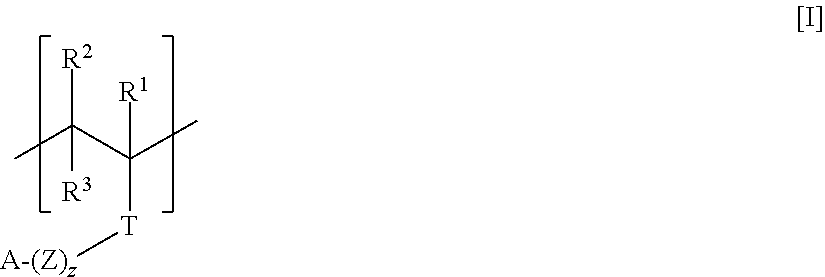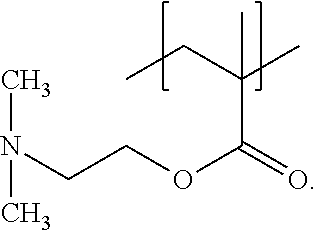Polymers, compositions and methods for use for foams, laundry detergents, shower rinses and coagulants
a technology of polymers and compositions, applied in the field of polymers, compositions and methods for use of foams, laundry detergents, shower rinses and coagulants, can solve the problems of wasteful detergent use, consumer addition of additional detergent, and influence on the efficacy of liquid detergents, etc., to achieve the effect of prolonging the suds volume and duration
- Summary
- Abstract
- Description
- Claims
- Application Information
AI Technical Summary
Benefits of technology
Problems solved by technology
Method used
Image
Examples
example 1
Preparation of Poly(HEA-co-DMAM-co-AA) (9:3:1) Terpolymer
[0664]2-Hydroxyethyl acrylate (25.00 g, 215.3 mmol), 2-(dimethylamino)ethyl methacrylate (11.28 g, 71.8 mmol), acrylic acid (1.71 g, 23.7 mmol), 2,2′-azobisisobutyronitrile (0.26 g, 1.6 mmol), 1,4-dioxane (150 ml) and 2-propanol (30 ml) are placed into a 500 ml three-necked round-bottomed flask, fitted with a heating mantle, magnetic stirrer, internal thermometer and argon inlet. The mixture is sparged with nitrogen for 30 minutes to remove dissolved oxygen. The mixture is heated for 18 hours with stirring at 65° C. TLC (diethyl ether) indicates consumption of monomer. An equal volume of water is added and the mixture is concentrated under vacuum by rotary evaporation to remove the solvent. Water is added to make a 10% solution and the mixture is lyophilized and then pulverized in a blender to yield an off-white powder. NMR is consistent with the desired compound.
example 2
Preparation of Poly(HPA-co-DMAM-co-AA) (9:3:1) Terpolymer
[0665]Hydroxypropyl acrylate (25.00 g, 192.1 mmol), 2-(dimethylamino)ethyl methacrylate (10.07 g, 64.0 mmol), acrylic acid (1.52 g, 21.1 mmol), 2,2′-azobisisobutyronitrile (0.23 g, 1.4 mmol), 1,4-dioxane (150 ml) and 2-propanol (30 ml) are placed into a 500 ml three-necked round-bottomed flask, fitted with a heating mantle, magnetic stirrer, internal thermometer and argon inlet. The mixture is sparged with nitrogen for 30 minutes to remove dissolved oxygen. The mixture is heated for 18 hours with stirring at 65° C. TLC (diethyl ether) indicates consumption of monomer. An equal volume of water is added and the mixture is concentrated under vacuum by rotary evaporation to remove the solvent. Water is added to make a 10% solution and the mixture is lyophilized and then pulverized in a blender to yield an off-white powder. NMR is consistent with the desired compound.
example 3
Preparation of Poly(HEA-co-DMAM) (3:1) Copolymer
[0666]2-Hydroxyethyl acrylate (30.00 g, 258.4 mmol), 2-(dimethylamino)ethyl methacrylate (13.54 g, 86.1 mmol), 2,2′-azobisisobutyronitrile (0.28 g, 1.7 mmol), 1,4-dioxane (150 ml) and 2-propanol (30 ml) are placed into a 500 ml three-necked round-bottomed flask, fitted with a heating mantle, magnetic stirrer, internal thermometer and argon inlet. The mixture is sparged with nitrogen for 30 minutes to remove dissolved oxygen. The mixture is heated for 18 hours with stirring at 65° C. TLC (diethyl ether) indicates consumption of monomer. An equal volume of water is added and the mixture is concentrated under vacuum by rotary evaporation to remove the solvent. Water is added to make a 10% solution and the mixture is lyophilized and then pulverized in a blender to yield an off-white powder. NMR is consistent with the desired compound.
PUM
| Property | Measurement | Unit |
|---|---|---|
| molar ratio | aaaaa | aaaaa |
| pH | aaaaa | aaaaa |
| density | aaaaa | aaaaa |
Abstract
Description
Claims
Application Information
 Login to View More
Login to View More - R&D
- Intellectual Property
- Life Sciences
- Materials
- Tech Scout
- Unparalleled Data Quality
- Higher Quality Content
- 60% Fewer Hallucinations
Browse by: Latest US Patents, China's latest patents, Technical Efficacy Thesaurus, Application Domain, Technology Topic, Popular Technical Reports.
© 2025 PatSnap. All rights reserved.Legal|Privacy policy|Modern Slavery Act Transparency Statement|Sitemap|About US| Contact US: help@patsnap.com



